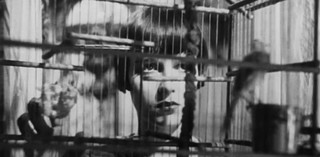Live Music & Film Prix De Beauté

Production still from Prix de Beauté 1930 | Director: Augusto Genina | Image courtesy: Cineteca di Bologna / View full image
When
31 Aug 2014
Where
Gallery of Modern Art, Cinema A
About
Augusto Genina's Prix de Beauté 1930 features the luminous Louise Brooks in her last major role. It tells the story of bored Parisian typist Lucienne, who enters a newspaper beauty contest as a lark only to find herself the winning contestant. Glamour and romance beckon, including a royal suitor, Lucienne is caught between the opportunity to escape her mundane life and the desires of her jealous boyfriend.
As Dennis Harvey wrote for the San Francisco Silent Film Festival:
'Beauty pageants were still a relatively novel object of public curiosity at the time, and Genina brings a near-documentary feel to much of the early film. More novel still was the ambitious script's gender dynamic [written by Georg Wilhelm Pabst and René Clair]. While a typical movie of the era (and for many years after) found the career girl coming to her senses and realising that all she really wants is to stay home and do hubby's washing, here Lucienne is clearly oppressed by André's controlling love.'
Prix de Beauté was produced over the period when cinema was of the transitioning from silent to sound and two versions of the film were completed, with the rather clunky early sound film more generally available. This presentation with live accompaniment by David Bailey on the Gallery's 1929 Wurlitzer organ showcases recent restoration by the Cineteca di Bologna of the superior silent version.
David Bailey
David Bailey developed a deep fascination with early 20th Century music at a young age which led to studies in piano and in particular the world of ragtime. As a teenager Bailey stumbled on the world of the cinema organ and was captivated by the rare and vast tonal and dynamic abilities of these instruments. A transition to organ studies followed and a deep passion grew for the music of the 20's and 30's and in turn their relationship to the world of silent cinema. Today Bailey is immersed in this musical world and personalities such as Sophie Tucker, Billie Holiday and Stephane Grappelli as well as theatre organists Sidney Torch and George Wright.
Bailey continues to perform in concert for many organ societies in Queensland, New South Wales, Victoria, Western Australia and New Zealand. Since the installation of the rare Wurlitzer style 260 organ in the Australian Cinémathèque in 2006 (originally housed in Brisbane's Regent Theatre) he has composed and performed new film scores for many of the silent cinema programs held at the Gallery of Modern Art.

